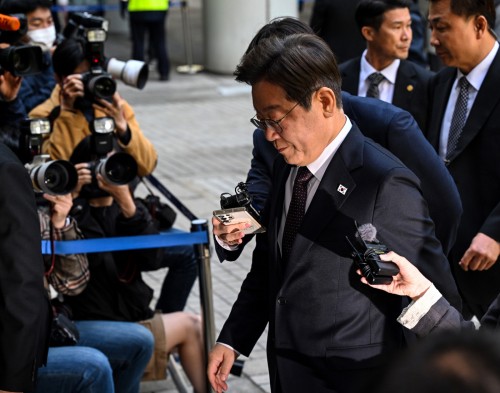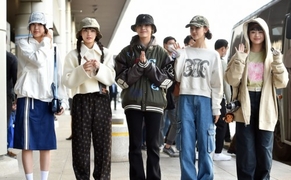 |
| Lee Jae-myung, the presidential candidate of the Democratic Party of Korea, arrives at the Seoul Central District Court in Seocho District, Seoul, on April 29 to attend a continued first trial hearing on charges related to the Daejang-dong breach of duty case and alleged bribery involving Seongnam FC. / Photo by Song Ui-joo |
The Supreme Court of Korea is set to deliver its final ruling on May 1 in the election law violation case involving Democratic Party presidential candidate Lee Jae-myung—his most serious legal risk ahead of the June 3 presidential election. Legal experts say the unusually swift timeline for the ruling could significantly shake up the race, though the outcome remains difficult to predict.
According to judicial sources on April 29, criminal appeals cases at the Supreme Court typically take about three months to conclude. Lee’s case, however, has proceeded with uncommon speed, especially given that it was assigned to the en banc bench, which generally takes longer than rulings handled by a four-justice panel.
Excluding Chief Election Commissioner Noh Tae-ak, 12 justices—including Chief Justice Cho Hee-dae—participated in the deliberations. They held two closed-door meetings on April 22 and 24 to assess the legal merits of the case and whether the appellate court’s acquittal had any flaws. The verdict will be decided by majority vote.
Some in the legal community speculate that the rapid scheduling of the verdict suggests there was little dissent among the justices and that the court may uphold the acquittal. Attorney Lee Heon said, “The May 1 ruling date—earlier than the ‘6-3-3 rule’ norm—is likely timed with the presidential candidate registration deadline. A fast-tracked verdict often indicates agreement among justices and could mean the Supreme Court plans to dismiss the prosecution’s appeal.”
Others, however, believe the court may overturn the acquittal and remand the case, noting that past rulings on contentious cases with conflicting lower court decisions have often sided with one position. A former deputy chief prosecutor noted, “The first trial favored the prosecution’s argument, while the second backed Lee. It’s possible the justices find the prosecution’s appeal reasonable. That said, a ruling that would disqualify Lee from running is unlikely.”
Still, a minority view suggests the en banc panel could directly issue a conviction with a fine exceeding 1 million won—known as pagi-japan—which would strip Lee of his eligibility to register as a candidate. Attorney Jung Joon-gil argued that the case meets all the conditions for such a ruling: “This is a fully investigated case, with no need for further fact-finding. A direct conviction or at least a remand seems possible.”
Lee Heon agreed that while rare, pagi-japan cannot be ruled out: “This is a highly unusual case—Lee is a four-time offender, including on election law charges, and he's now running for president. Given public criticism of the appellate ruling, the court could break precedent.”
Following his continued criminal trial on breach of duty and bribery charges at the Seoul Central District Court earlier that day, Lee responded briefly to reporters asking about the unusually fast Supreme Court ruling date: “They’ll follow the law, I assume.”
Most Read
-
1
-
2
-
3
-
4
-
5
-
6
-
7





















